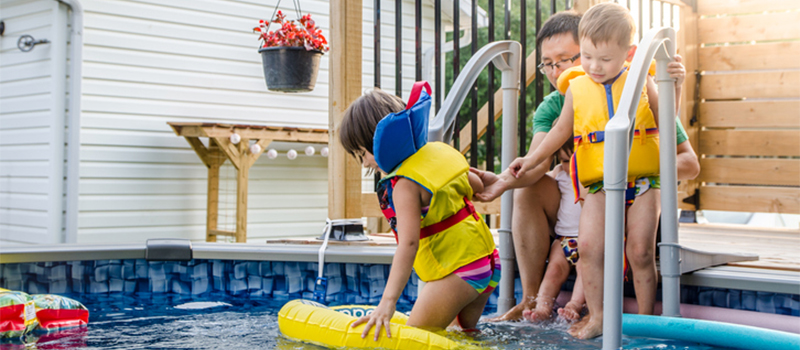Be Safe During Pool Season with These Tips
Be Safe During Pool Season with These Tips

Be Safe During Pool Season with These Tips
Jumping into a swimming pool can be one of the quickest and most pleasurable ways to cool down on a hot day. But that fun water recreation can turn tragic in seconds if an accidental drowning occurs.
Toddlers, teens, and adults are all vulnerable to drowning, and it often happens quickly and quietly. Use the following tips to help create multiple layers of protection around your pool and other swimming spots.
1. Install a fence around your pool in compliance with your state regulations.
The specifics of height, size of allowable gaps in the fence, alarm systems, and latching and locking devices can vary from state to state. All these requirements to ensure neighborhood children, pets and wildlife do not have free access to your pool when you are not home.
2. Always provide adult supervision for children around a pool.
This person should not be using a phone, texting, or socializing. Young children should be equipped with life jackets. And even if you are at a public pool with lifeguards, parents and caregivers should still be on high alert and watchful. Lifeguards often cannot see the entire pool, or their view of your child may be blocked by other swimmers.
Adults should not swim alone either in case a sudden illness or injury would necessitate help getting out of the pool safely. Always have a phone close by when around the pool in case you need to call for help.
3. Learn CPR.
CPR is fast and easy to learn, and free classes are typically available through local hospitals, universities, community centers and the American Red Cross. All adults and older children in the family should be comfortable administering CPR. It is also a good idea to post resuscitation instructions on your pool fence.
4. Take family swimming lessons.
The American Academy of Pediatrics recommends formal swimming lessons for children aged one year and older. Look for free or reduced-cost swimming lessons at your local YMCA, Parks and Recreation Department or USA Swimming chapter.
5. Understand what type of insurance you need if you have a pool.
Your homeowners policy might let you insure your swimming pool with an endorsement, but it is important to know how accidents and injuries are handled. An above-ground pool may also be covered differently from an in-ground pool. Consult your insurance agent for more information on protecting your family's financial security.
